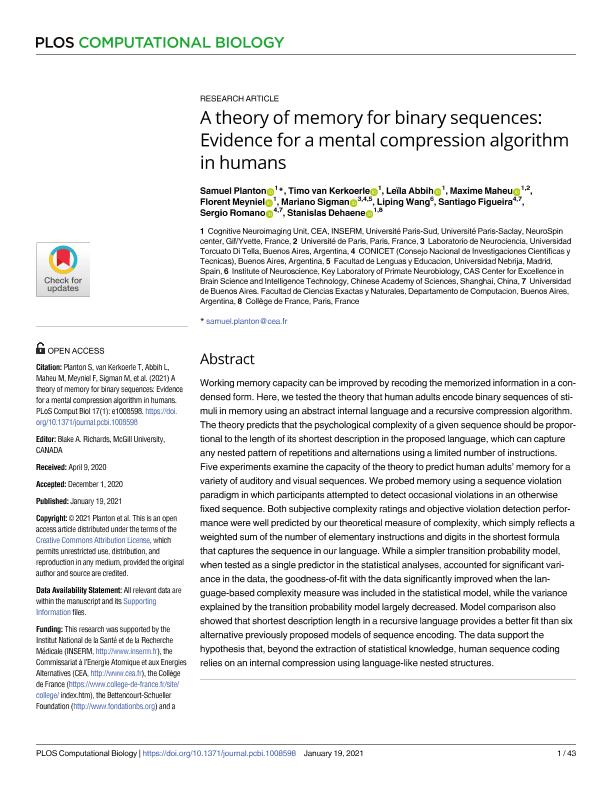Artículo
A theory of memory for binary sequences: Evidence for a mental compression algorithm in humans
Planton, Samuel; van Kerkoerle, Timo; Abbih, Leïla; Maheu, Maxime; Meyniel, Florent; Sigman, Mariano ; Wang, Liping; Figueira, Santiago
; Wang, Liping; Figueira, Santiago ; Romano, Sergio Gaston
; Romano, Sergio Gaston ; Dehaene, Stanislas
; Dehaene, Stanislas
 ; Wang, Liping; Figueira, Santiago
; Wang, Liping; Figueira, Santiago ; Romano, Sergio Gaston
; Romano, Sergio Gaston ; Dehaene, Stanislas
; Dehaene, Stanislas
Fecha de publicación:
01/2021
Editorial:
Public Library of Science
Revista:
Plos Computational Biology
ISSN:
1553-734X
Idioma:
Inglés
Tipo de recurso:
Artículo publicado
Clasificación temática:
Resumen
Working memory capacity can be improved by recoding the memorized information in a condensed form. Here, we tested the theory that human adults encode binary sequences of stimuli in memory using an abstract internal language and a recursive compression algorithm. The theory predicts that the psychological complexity of a given sequence should be proportional to the length of its shortest description in the proposed language, which can capture any nested pattern of repetitions and alternations using a limited number of instructions. Five experiments examine the capacity of the theory to predict human adults’ memory for a variety of auditory and visual sequences. We probed memory using a sequence violation paradigm in which participants attempted to detect occasional violations in an otherwise fixed sequence. Both subjective complexity ratings and objective violation detection performance were well predicted by our theoretical measure of complexity, which simply reflects a weighted sum of the number of elementary instructions and digits in the shortest formula that captures the sequence in our language. While a simpler transition probability model, when tested as a single predictor in the statistical analyses, accounted for significant variance in the data, the goodness-of-fit with the data significantly improved when the language-based complexity measure was included in the statistical model, while the variance explained by the transition probability model largely decreased. Model comparison also showed that shortest description length in a recursive language provides a better fit than six alternative previously proposed models of sequence encoding. The data support the hypothesis that, beyond the extraction of statistical knowledge, human sequence coding relies on an internal compression using language-like nested structures.
Archivos asociados
Licencia
Identificadores
Colecciones
Articulos(ICC)
Articulos de INSTITUTO DE INVESTIGACION EN CIENCIAS DE LA COMPUTACION
Articulos de INSTITUTO DE INVESTIGACION EN CIENCIAS DE LA COMPUTACION
Articulos(SEDE CENTRAL)
Articulos de SEDE CENTRAL
Articulos de SEDE CENTRAL
Citación
Planton, Samuel; van Kerkoerle, Timo; Abbih, Leïla; Maheu, Maxime; Meyniel, Florent; et al.; A theory of memory for binary sequences: Evidence for a mental compression algorithm in humans; Public Library of Science; Plos Computational Biology; 17; 1; 1-2021; 1-43
Compartir
Altmétricas



